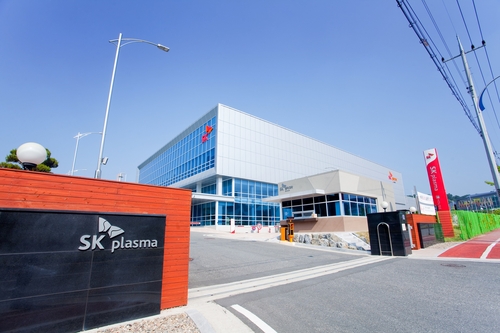
(Seoul=Yonhap Infomax) Su In Jeong – SK Plasma, a leading South Korean biopharmaceutical company specializing in blood products, has been chosen as the technology export partner for Türkiye’s national strategy to achieve self-sufficiency in plasma fractionation products. Plasma fractionation products are pharmaceuticals derived from human plasma.
The company announced it has signed an agreement with the Turkish Red Crescent (the Islamic world’s equivalent of the Red Cross) to establish a joint venture, ‘Proturk’, aimed at localizing the production of essential medicines. SK Plasma will participate in the construction of a local plant, securing both technology transfer fees and a 15% stake in the joint venture, marking its full-scale entry into the Turkish blood products market, which has historically relied heavily on imports.
On the 24th (local time), SK Plasma signed a shareholder agreement in Ankara, Türkiye, with the Turkish Red Crescent to build a plasma fractionation plant and establish the joint venture ‘Proturk’ for the localization of essential medicines, the company said on the 25th.
The signing ceremony took place during a summit between the two countries’ leaders, attended by Kim Seung-joo, CEO of SK Plasma, and Fatma Meric Yilmaz, President of the Turkish Red Crescent.
Under the agreement, SK Plasma will receive technology transfer fees and secure a 15% stake in Proturk. The remaining 85% will be held by Kizilay Yatrim, an investment arm of the Turkish Red Crescent, and government agencies.
The new joint venture, Proturk, plans to build a plasma fractionation facility in the Cubuk region of Ankara, with an annual processing capacity of 600,000 liters of plasma. The plant will produce albumin (ABM) for protein supplementation, intravenous immunoglobulin (IVIG) for immunodeficiency treatment, and Factor VIII (FVIII) for blood coagulation disorders.
SK Plasma will transfer plasma fractionation production technology to Proturk and receive technology fees in stages. Upon completion of the plant, Türkiye will be able to locally produce plasma fractionation products, which it previously imported entirely.
Until the facility is operational, SK Plasma will use plasma supplied from Türkiye to manufacture finished products such as albumin and immunoglobulin at its Andong plant in South Korea under a contract manufacturing (CMO) arrangement, supplying them to the Turkish market. Additionally, SK Plasma will provide phased training to local technical staff based on its production experience in Andong, enabling rapid local production and sales immediately after the plant’s completion.
Kim Seung-joo, CEO of SK Plasma, stated, “Establishing local infrastructure is a new business model that not only enhances self-sufficiency in plasma fractionation products for countries in need, but also ensures stable demand. We will actively seek new opportunities in countries requiring self-reliance in essential medicines.”
sijung@yna.co.kr
(End)
Copyright © Yonhap Infomax Unauthorized reproduction and redistribution prohibited.

